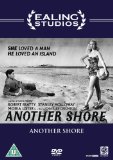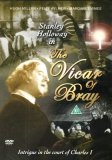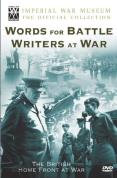![A Day to Remember [DVD]](/pictures/1113341.jpg) A Day to Remember | DVD | (20/02/2012)
from £4.99
| Saving you £8.00 (160.32%)
| RRP
A Day to Remember | DVD | (20/02/2012)
from £4.99
| Saving you £8.00 (160.32%)
| RRP A Day to Remember is a 1953 British comedy drama film directed by Ralph Thomas and starring an ensemble cast including Stanley Holloway, Donald Sinden, Bill Owen and Thora Hird. The darts team of a London public house go on a day trip to Boulogne-sur-Mer in France. Members of the party have different reasons for going on the trip and get into various adventures along the way.
![The Beggar's Opera [1952]](/pictures/1081078.jpg) The Beggar's Opera | DVD | (07/04/2008)
from £10.35
| Saving you £5.64 (54.49%)
| RRP
The Beggar's Opera | DVD | (07/04/2008)
from £10.35
| Saving you £5.64 (54.49%)
| RRP The Beggar's Opera captures the quality and satiric edge of the Hogarth engravings that influenced John Gay's original version. The fast-paced scenes scintillating dialogue and inventive music have made this ballad opera an overwhelming success time and again.
![Fast & Loose [DVD]](/pictures/1148497.jpg) Fast & Loose | DVD | (17/12/2018)
from £6.99
| Saving you £N/A (N/A%)
| RRP
Fast & Loose | DVD | (17/12/2018)
from £6.99
| Saving you £N/A (N/A%)
| RRP Charming 1950's farce superbly written by the legendary Ben Travers. A young married couple, Peter (Brian Reece) and Barbara (June Thorburn) are travelling by train to the countryside for a romantic weekend, Leaving Barbara in the train on the platform Peter pops out to buy a newspaper, but meets old flame Carol (Kay Kendall) at the news stand. While Peter and Carol are chatting Barbara's train leaves for the country without him. Peter, accompanied by Carol frantically tries to catch up with his wife, hiring a car in order to drive to the hotel. Unfortunately for Peter the car breaks down and he ends up spending a night with Carol in a remote Inn. Barbara meanwhile has enlisted the help of her parents in order to track down her husband and the ensuing chase leads to a hilarious series of misadventures that you would anticipate from a Ben Travers script. Stanley Holloway is superbly cast as Barbara's downtrodden father of Barbara.
![Lady Godiva Rides Again [DVD]](/pictures/1153149.jpg) Lady Godiva Rides Again | DVD | (01/06/2020)
from £7.99
| Saving you £N/A (N/A%)
| RRP
Lady Godiva Rides Again | DVD | (01/06/2020)
from £7.99
| Saving you £N/A (N/A%)
| RRP An unsophisticated and impressionable young girl finds herself in trouble after winning a beauty pageant.
 Ealing Studios Boxset 2 | DVD | (16/10/2006)
from £N/A
| Saving you £N/A (N/A%)
| RRP
Ealing Studios Boxset 2 | DVD | (16/10/2006)
from £N/A
| Saving you £N/A (N/A%)
| RRP A superb box set featuring 4 golden Ealing classics. Includes: 1. The Lavender Hill Mob (Dir. Charles Crichton 1951) 2. Titfield Thunderbolt (Dir. Charles Crichton 1953) 3. Hue & Cry (Dir. Charles Crichton 1947) 4. Dead of Night (Dirs. Alberto Cavalcanti & Charles Crichton 1945)
![Another Shore [Blu-ray]](/pictures/1151553.jpg) Another Shore | Blu Ray | (11/05/2020)
from £14.71
| Saving you £N/A (N/A%)
| RRP
Another Shore | Blu Ray | (11/05/2020)
from £14.71
| Saving you £N/A (N/A%)
| RRP A whimsical comedy from Ealing Films, starring Robert Beatty as an idle fantasist and Moira Lister as the girl who falls for what she believes is his poetic charm. Supported by Stanley Holloway and directed by the legendary Charles Crichton, Another Shore is featured here as a brand-new High Definition transfer from original film elements in its as-exhibited theatrical aspect ratio. Gulliver Shiels lies abed in Dublin, loafing to the best of his ability. He whiles away his time dreaming of a South Sea island that, he believes, will be bequeathed to him for an act of selfless charity. When he bumps into ace toper Alastair McNeil, Shiels believes that McNeil could be the benefactor of his daydreams. Special Features: Image gallery
 Another Shore | DVD | (02/02/2009)
from £11.98
| Saving you £7.00 (77.86%)
| RRP
Another Shore | DVD | (02/02/2009)
from £11.98
| Saving you £7.00 (77.86%)
| RRP Another Shore
![One Wild Oat [DVD]](/pictures/1109103.jpg) One Wild Oat | DVD | (24/09/2007)
from £10.58
| Saving you £2.41 (22.78%)
| RRP
One Wild Oat | DVD | (24/09/2007)
from £10.58
| Saving you £2.41 (22.78%)
| RRP Humphrey Proudfoot (Robertson Hare) is a class-conscious solicitor whose daughter falls in love with the son of a disreputable greyhound owner Alfred Gilbey (Stanley Holloway). After Humphrey fails to convince his daughter not to marry the young Gilbey he employs a private investigator in order to dig up some dirt on the womanising gambler. But his sneaky shenanigans backfire when Gilbey discovers Proudfoot's first love Emily (Irene Handl). When Emily turns up at the same time as Gilbey's mistress Gloria the two men suddenly find themselves on the same side as they struggle to keep their two women away from their wives in this classic farce!
![Another Shore [DVD]](/pictures/1151468.jpg) Another Shore | DVD | (11/05/2020)
from £9.08
| Saving you £N/A (N/A%)
| RRP
Another Shore | DVD | (11/05/2020)
from £9.08
| Saving you £N/A (N/A%)
| RRP A whimsical comedy from Ealing Films, starring Robert Beatty as an idle fantasist and Moira Lister as the girl who falls for his poetic charm. Supported by Stanley Holloway and directed by the legendary Charles Crichton, Another Shore is featured here as a brand-new remaster from original film elements in its as-exhibited theatrical aspect ratio. Gulliver Shiels lies abed in Dublin, loafing to the best of his ability. He whiles away his time dreaming of a South Sea island that, he believes, will be bequeathed to him for an act of selfless charity. When he bumps into ace toper Alastair McNeil, Shiels believes that McNeil could be the benefactor of his daydreams. SPECIAL FEATURE: Image gallery
![Jumping for joy [DVD]](/pictures/1108539.jpg) Jumping for joy | DVD | (27/06/2011)
from £N/A
| Saving you £N/A (N/A%)
| RRP
Jumping for joy | DVD | (27/06/2011)
from £N/A
| Saving you £N/A (N/A%)
| RRP It's a dog's life in this hilarious British comedy! When Willie Joy (comedy legend Frankie Howerd) is fired from his job at the greyhound stadium he takes pity on a fellow victim and adopts an injured greyhound called Lindy Lou who would otherwise be destroyed. Teaming up with amiable con-man 'Captain' Montague (Stanley Holloway - The Lavender Hill Mob The Titfield Thunderbolt) Willie decides to train Lindy to compete for the prestigious Golden Bowl trophy. But it's not just the other dogs she has to beat - there are crooked bookies and race-track spivs to deal with too!
![Up The Front [1972]](/pictures/1014344.jpg) Up The Front | DVD | (06/09/2004)
from £N/A
| Saving you £N/A (N/A%)
| RRP
Up The Front | DVD | (06/09/2004)
from £N/A
| Saving you £N/A (N/A%)
| RRP Frankie Howerd stars as a lowly boot-boy who is a terrible coward and only goes to war after he has been hypnotised to 'Save England'! With the German master plan tattooed on his backside he goes to the British headquarters with the Germans in hot pursuit to try and 'hand over the plans'!
![Trevor Howard: Collection [DVD]](/pictures/1123180.jpg) Trevor Howard: Collection | DVD | (23/09/2013)
from £N/A
| Saving you £N/A (N/A%)
| RRP
Trevor Howard: Collection | DVD | (23/09/2013)
from £N/A
| Saving you £N/A (N/A%)
| RRP Episodes Comprise: Brief Encounter The Third Man Odette Outcast of the Islands Heart of the Manner
![Cotton Queen [DVD]](/pictures/1122419.jpg) Cotton Queen | DVD | (24/06/2013)
from £16.25
| Saving you £-3.26 (N/A%)
| RRP
Cotton Queen | DVD | (24/06/2013)
from £16.25
| Saving you £-3.26 (N/A%)
| RRP Directed by Bernard Vorhaus and produced by the prolific Joe Rock at Rock Studios. Joe produced 123 tiles acted in 96 films and wrote 36. Cotton Queen is a story of two feuding Lancashire mill owners Sam (Stanley Holloway) and Bill (Will Fyffe). They find if they work together they can secure a major American contract. Further trouble ensues when Bills' niece (Mary Lawson) has a romance with Sams' son (Jimmy Hanley) - but all is sorted out at the annual Cotton Queen festival. Cotton Queen was the final film Vorhaus made in Britain. Following the collapse of Julius Hagen’s Twickenham Studios where he had directed most of his films during the previous few years. He then returned to the United States. Watch out for Gibson Gowland who played McTeague in Erich Von Stroheim's silent masterpiece Greed.
 Vicar of Bray | DVD | (03/07/2006)
from £4.99
| Saving you £5.00 (100.20%)
| RRP
Vicar of Bray | DVD | (03/07/2006)
from £4.99
| Saving you £5.00 (100.20%)
| RRP A delightful British romantic comedy set at the time of the English Civil War.
![The Beggar's Opera [1952]](/pictures/1011798.jpg) The Beggar's Opera | DVD | (28/06/2004)
from £N/A
| Saving you £N/A (N/A%)
| RRP
The Beggar's Opera | DVD | (28/06/2004)
from £N/A
| Saving you £N/A (N/A%)
| RRP Peter Brook's bold adaptation of John Gay's opera - a cynical satire of eighteenth century London life. This weird and wonderful movie version of the first ever English musical to be written boasts a gloriously outlandish set and characters adorned in stunning primary colours that will dazzle and delight. A period piece that remains true to its original form it features non-stop sing-along songs spirited melodies and a real sense of embellished drama. The story follows the escapades of a jailed highwayman and stars Laurence Olivier Dorothy Tutin and Stanley Holloway.
![Squibs [DVD]](/pictures/1118747.jpg) Squibs | DVD | (09/10/2012)
from £8.83
| Saving you £4.16 (47.11%)
| RRP
Squibs | DVD | (09/10/2012)
from £8.83
| Saving you £4.16 (47.11%)
| RRP Betty Balfour returns in the role of 'Squibs' a character that made her famous in the silent film era. Directed by Henry Edwards co-founder of New Art Productions. One of the main stays of Twickenham Studios - made in 1935, in this Musical Comedy Squibs, (Betty Balfour) a cockney flower seller has a burgeoning romance with policeman (Stanley Holloway), but the tryst is threatened by the gambling of Squibs's father (Gordon Harker). With the help of her friends and a lottery ticket... ...
![Target - Harry [1979]](/pictures/1080313.jpg) Target - Harry | DVD | (31/03/2008)
from £4.15
| Saving you £-1.16 (-38.80%)
| RRP
Target - Harry | DVD | (31/03/2008)
from £4.15
| Saving you £-1.16 (-38.80%)
| RRP Freelance pilot Harry Black (Vic Morrow) finds both the Monte Carlo police and the underworld hot on his trail when he becomes caught up in the plans of one of his passengers - to break the Bank of England using forged currency. The tension mounts as Harry struggles to find the plates used to forge the notes and thus prove his innocence....
 Britain's Home Front At War - Words For Battle | DVD | (12/02/2007)
from £N/A
| Saving you £N/A (N/A%)
| RRP
Britain's Home Front At War - Words For Battle | DVD | (12/02/2007)
from £N/A
| Saving you £N/A (N/A%)
| RRP This collection features stirring and inspirational films urging the nation to fight on and to preserve our British heritage and way of life. Words For Battle (1941): Laurence Olivier reads extracts from great works by the likes of Milton Blake and Kipling illustrated by inspirational film of both a timeless pastoral Britain and a modern armed Britain poised for war. Lift Your Head Comrade (1942): A powerful propaganda piece looking at German and Austrian anti-fascists who have volunteered to service with the Pioneer Corps to help Britain in its war against Germany. (Script: Arthur Koestler) The New Britain (1940): This MOI production evokes the utopia that Britain could have become in the decades following the Great War if only German fascism had not raised its head. (Script: Grahame Greene) Worker And Warfront No.8 (1943): Stanley Holloway provides the voiceover in this animated warning about a worker too tough to get his wounds checked - and who then contracts blood poisoning. (Script: E.C. Bentley) Britain At Bay (1940): J.B. Priestley provides the commentary for a film produced immediately after the fall of France celebrating British values and reminding us that in the months ahead Britain stands alone and at bay in guarding 'the future of the civilised world'. Essential Jobs (1942): A fascinating film showing how all unglamorous jobs actually contribute to the war effort. (Script: V.S. Pritchett) Albert's Savings (1940): Stanley Holloway delivers an 'Albert'-style monologue as he persuades the nation to invest in Savings Certificates for the war effort. (Script: Edgar Marriott) A Diary For Timothy (1945): Michael Redgrave John Gielgud and Myra Hess contribute to Humphrey Jennings' impressionistic portrait of a Britain finally poised to celebrate the end of the war. (Script: E.M. Forster) New Towns For Old (1942): An MOI film looking at urban regeneration in the fictional industrial town of 'Smokedale'. (Script: Dylan Thomas)
![This Happy Breed [1944]](/pictures/1086276.jpg) This Happy Breed | DVD | (15/09/2008)
from £N/A
| Saving you £N/A (N/A%)
| RRP
This Happy Breed | DVD | (15/09/2008)
from £N/A
| Saving you £N/A (N/A%)
| RRP This Happy Breed' is a splendidly acted classic portraying how an ordinary British family lived between the wars. Just after WWI the Gibbons family moves to a nice house in the suburbs. The inhabitants of 17 Sycamore Road are ordinary people with their irritable in-laws their just plain folks camaraderie and their unshakeable belief that no matter how hard the times are Mother England is forged of good stock and common sense will somehow prevail. This is a wonderful adaptation of Noel Coward's play written by Anthony Havelock-Allan and directed by David Lean who brought us the critically acclaimed classic 'Brief Encounter'.
![The Titfield Thunderbolt [1953]](/pictures/1011814.jpg) The Titfield Thunderbolt | DVD | (21/06/2004)
from £8.39
| Saving you £5.60 (66.75%)
| RRP
The Titfield Thunderbolt | DVD | (21/06/2004)
from £8.39
| Saving you £5.60 (66.75%)
| RRP When an antiquated railway line is threatened with closure the villagers decide to run it themselves and enter into frenzied competition with the local bus route with hilarious consequences! Director Charles Crichton and writer Tibby Clarke team up again for the first Ealing comedy to be produced in Technicolor. The defiance of authority by local inhabitants was a favourite topic in the 40's and 50's and embellishes the characteristic Ealing theme - 'small is beautiful and big is bad'.

Please wait. Loading...
This site uses cookies.
More details in our privacy policy